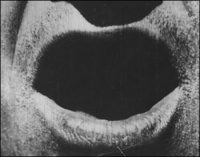Freedom of speech
From The Art and Popular Culture Encyclopedia

This page Freedom of speech is part of the censorship series.
Illustration: a close-up of a mouth in the film The Big Swallow (1901)
Illustration: a close-up of a mouth in the film The Big Swallow (1901)
|
Related e |
|
Featured: |
Freedom of speech is the political right to communicate one's opinions and ideas using one's body and property to anyone who is willing to receive them. The term freedom of expression is sometimes used synonymously, but includes any act of seeking, receiving and imparting information or ideas, regardless of the medium used. In practice, the right to freedom of speech is not absolute in any country and the right is commonly subject to limitations, as with libel, slander, obscenity, sedition (including, for example inciting ethnic hatred), copyright violation, revelation of information that is classified or otherwise.
See also
- Academic freedom
- Digital rights
- Forbidden number
- Freedom of speech by country
- Freedom of thought
- Global Network Initiative
- Hate speech
- Heckler's veto
- Jyllands-Posten Muhammad cartoons controversy
- Laws against Holocaust denial
- List of censored T-shirts
- Market for loyalties theory
- Media transparency
- Political correctness
- Right to pornography
- Speech code
- Symbolic speech
Unless indicated otherwise, the text in this article is either based on Wikipedia article "Freedom of speech" or another language Wikipedia page thereof used under the terms of the GNU Free Documentation License; or on research by Jahsonic and friends. See Art and Popular Culture's copyright notice.

